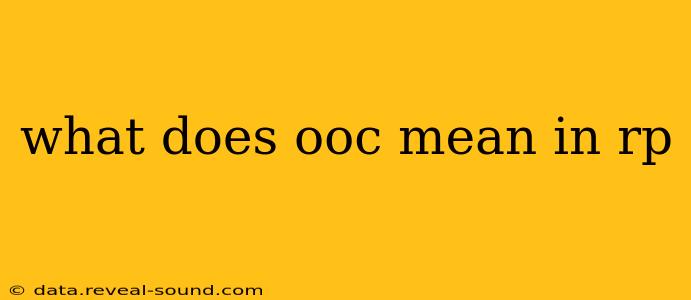For those new to the vibrant world of online roleplaying (RP), encountering acronyms and abbreviations can be confusing. One such term frequently used is "OOC." This guide will explain what OOC means in RP, explore its context, and address common related questions.
OOC stands for "Out Of Character." In roleplaying, it's a crucial term used to distinguish between actions and statements made within the roleplay narrative (IC, or "In Character") and those made by the player outside of that narrative. Think of it as stepping out of your character's persona to communicate as yourself.
Why is OOC Important in Roleplaying?
The OOC designation is critical for maintaining clarity and organization within an RP setting. It prevents confusion between the fictional actions of your character and your real-world communication with other players. For example, if your character is supposed to be angry and aggressive in the RP, but you want to ask another player a question about the plot, using "OOC" clarifies your intention. Without it, there's a risk of blurring the lines between fiction and reality.
Common Uses of OOC in RP
Here are some typical scenarios where you'd use "OOC":
- Asking questions about the plot or rules: "OOC: What time is the next event scheduled for?"
- Discussing character ideas or backstories: "OOC: I'm thinking of giving my character a new skill. What do you think?"
- Sharing meta-information: "OOC: Sorry for the delay, I had a real-life commitment."
- Resolving conflicts or disputes: "OOC: I think we might need to clarify how this fight is unfolding."
- Communicating technical issues: "OOC: My internet's a little laggy right now."
What is the Difference Between OOC and IC?
As mentioned, IC (In Character) refers to everything that happens within the roleplay's fictional world. It encompasses your character's actions, dialogue, thoughts, and feelings. OOC, on the other hand, is strictly for communication outside the fictional context. It's the meta-language of the roleplay.
How to Properly Use OOC in Your Roleplaying
The best practice is to clearly label OOC communications. Using "OOC:" or "[OOC]" at the beginning of your message is standard protocol and prevents misinterpretations. Also, be mindful of the flow of the RP. Excessive OOC interruptions can disrupt the immersion and enjoyment of other players.
What other terms are related to OOC?
While OOC is the most common term, you might also encounter similar phrases like:
- Meta: This term is often used interchangeably with OOC, referring to communication outside the fictional realm.
- Real Life (RL): Sometimes used to emphasize that a communication is unrelated to the RP.
Understanding the difference between OOC and IC is fundamental to successful and enjoyable roleplaying experiences. By consistently using the "OOC" designation, you contribute to a clear and organized environment, ensuring smooth and engaging interactions with fellow players.
